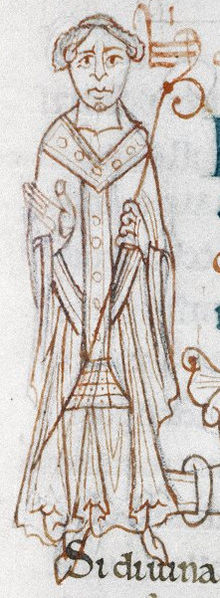Lanfranc (nonfiction): Difference between revisions
No edit summary |
|||
| Line 1: | Line 1: | ||
'''Lanfranc''' (Latin: Lanfrancus; Italian: Lanfranco; 1005 x 1010 at Pavia — 24 May 1089 at Canterbury) was a celebrated Italian jurist who renounced his career to become a Benedictine monk at Bec in Normandy. | [[File:Lanfranc_circa_1100.jpg|thumb|Lanfranc circa 1100.]]'''Lanfranc''' (Latin: Lanfrancus; Italian: Lanfranco; 1005 x 1010 at Pavia — 24 May 1089 at Canterbury) was a celebrated Italian jurist who renounced his career to become a Benedictine monk at Bec in Normandy. | ||
== Biography == | == Biography == | ||
Revision as of 09:02, 12 June 2016
Lanfranc (Latin: Lanfrancus; Italian: Lanfranco; 1005 x 1010 at Pavia — 24 May 1089 at Canterbury) was a celebrated Italian jurist who renounced his career to become a Benedictine monk at Bec in Normandy.
Biography
He served successively as prior of Bec Abbey and abbot of St Stephen in Normandy and then as archbishop of Canterbury in England, following its Conquest by William the Bastard.
He is also variously known as Lanfranc of Pavia (Italian: Lanfranco di Pavia), Lanfranc of Bec (French: Lanfranc du Bec), and Lanfranc of Canterbury (Latin: Lanfrancus Cantuariensis).
Revolt of the Earls
Lanfranc's greatest political service to the Conqueror was rendered in 1075, when he detected and foiled the conspiracy which had been formed by the earls of Norfolk and Hereford.
Waltheof, 1st Earl of Northumberland, one of the rebels, soon lost heart and confessed the conspiracy to Lanfranc, who urged Earl Roger, the earl of Hereford to return to his allegiance, and finally excommunicated him and his adherents.
He interceded for Waltheof’s life and to the last spoke of the earl as an innocent sufferer for the crimes of others; he lived on terms of friendship with Bishop Wulfstan of Worcester.
